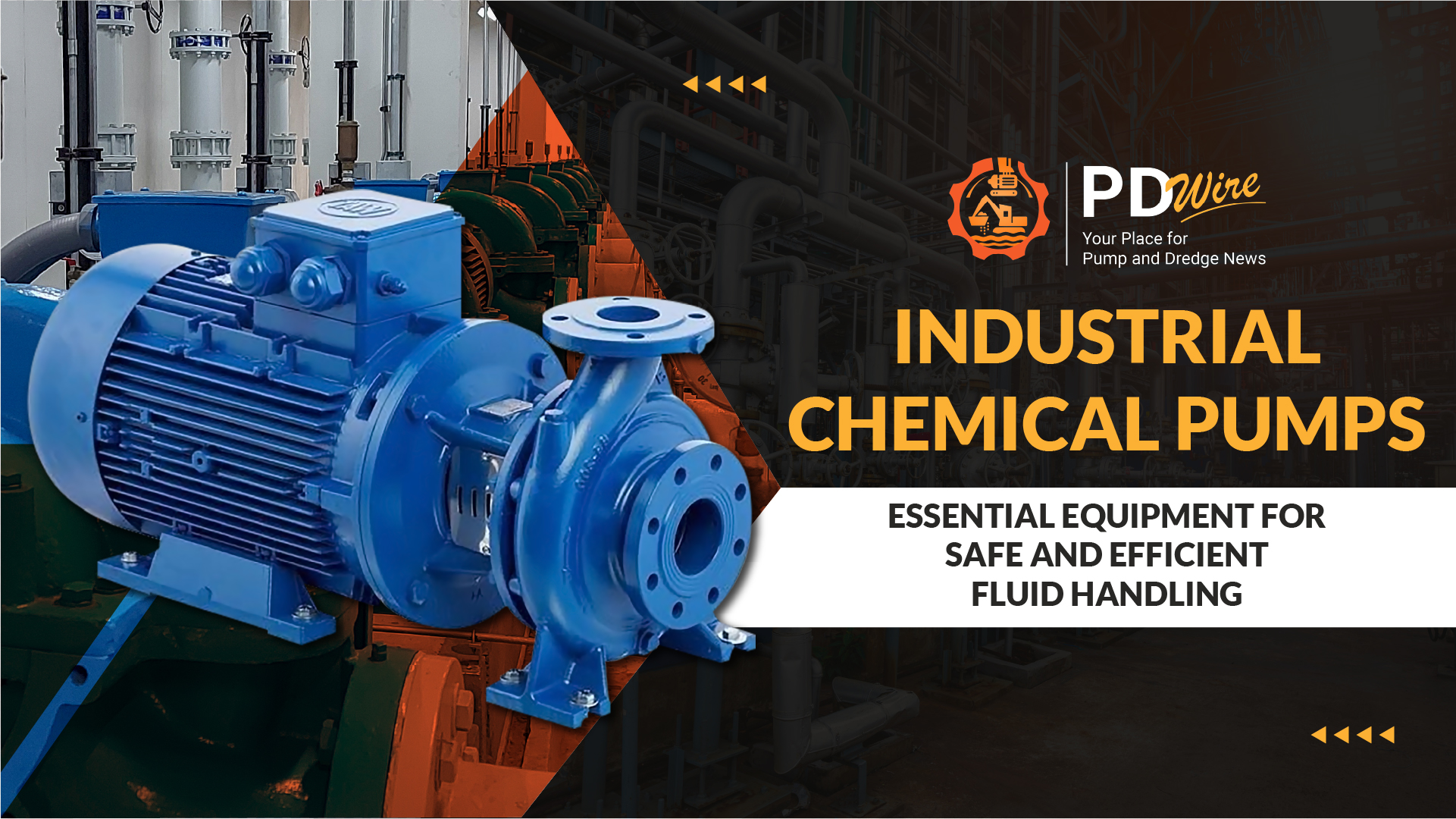- Understanding Industrial Chemical Pumps
- Common Types of the Chemical Pump
- The chemical pump is essential in industries to handle corrosive or hazardous substances.
- Improving Efficiency in Fluid Handling
- Applications Across Industries
- Selecting the Right Chemical Pump
- Maintenance and Longevity
- Emerging Trends and Innovations
- Conclusion
Understanding Industrial Chemical Pumps
Industrial chemical pumps are the backbone of fluid handling systems across numerous industries. From transferring corrosive chemicals in manufacturing plants to ensuring sterile processes in pharmaceutical production, these pumps play a vital role in maintaining operational safety and efficiency. Fluid handling is a critical component of industrial operations, and the right equipment ensures both productivity and regulatory compliance. Key industries such as oil and gas, pharmaceuticals, food and beverage, and water treatment depend on these pumps for their daily processes.
Understanding how industrial chemical pumps work and their diverse applications is essential for any operation involving fluid handling. This article explores their importance, functionality, and the innovations driving their evolution.
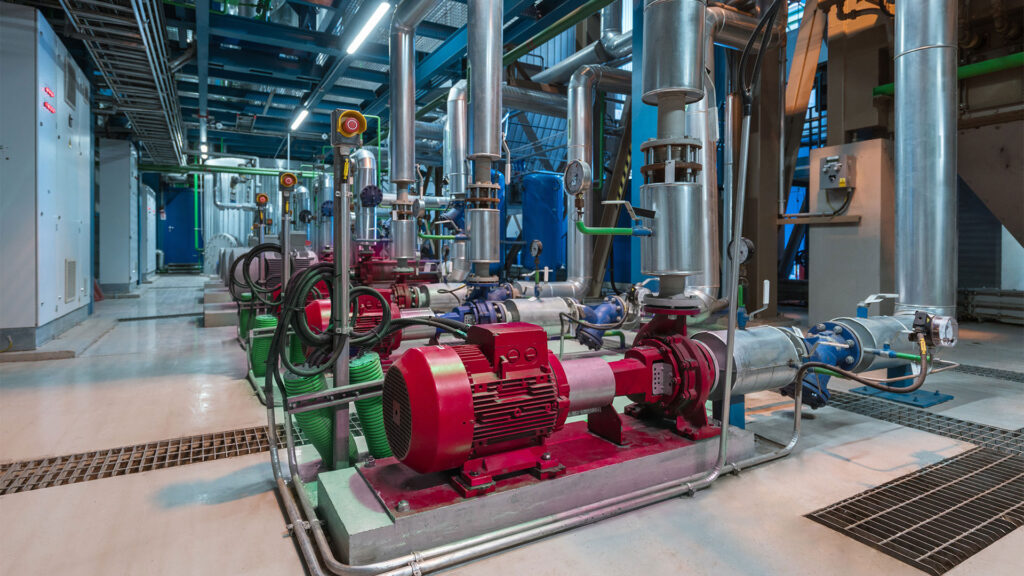
Definition and Primary Purpose
Industrial chemical pumps are specialized devices designed to transport various fluids, including corrosive, viscous, or hazardous substances. Their primary purpose is to enable the safe, efficient, and precise movement of these fluids in industrial environments.
Key Components and Working Principles
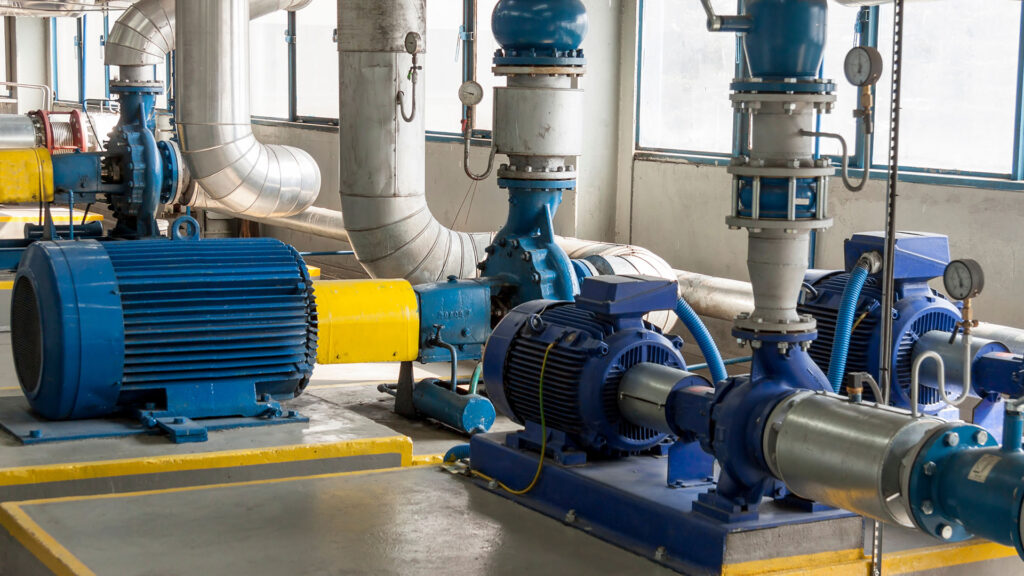
These pumps typically consist of the following components:
- Pump casing:
- The pump casing is the outer shell that houses the fluid and prevents leaks. It is typically made from corrosion-resistant materials like stainless steel, PTFE, or polypropylene to ensure longevity and safety when handling aggressive chemicals.
- Impellers or diaphragms:
- These components generate the pressure needed to move the fluid. Centrifugal pumps use impellers to create a flow by spinning, while diaphragm pumps move back and forth to create suction and pressure. Thus, they are ideal for handling viscous or hazardous fluids.
- Seals and gaskets:
- Seals and gaskets prevent fluid from escaping the pump casing, ensuring leak-free operation. Advanced designs often incorporate double seals or magnetic couplings to enhance safety and reduce maintenance requirements.
- Drive mechanisms:
- Drive mechanisms include electric motors, air systems, or magnetic drives that power the pump. Magnetic drives eliminate direct contact between the motor and the fluid, offering a leak-proof design that is ideal for handling volatile or hazardous substances.
The working principle of a pump varies depending on the type, but it generally involves creating a pressure differential to move fluids from one location to another.
Common Types of the Chemical Pump
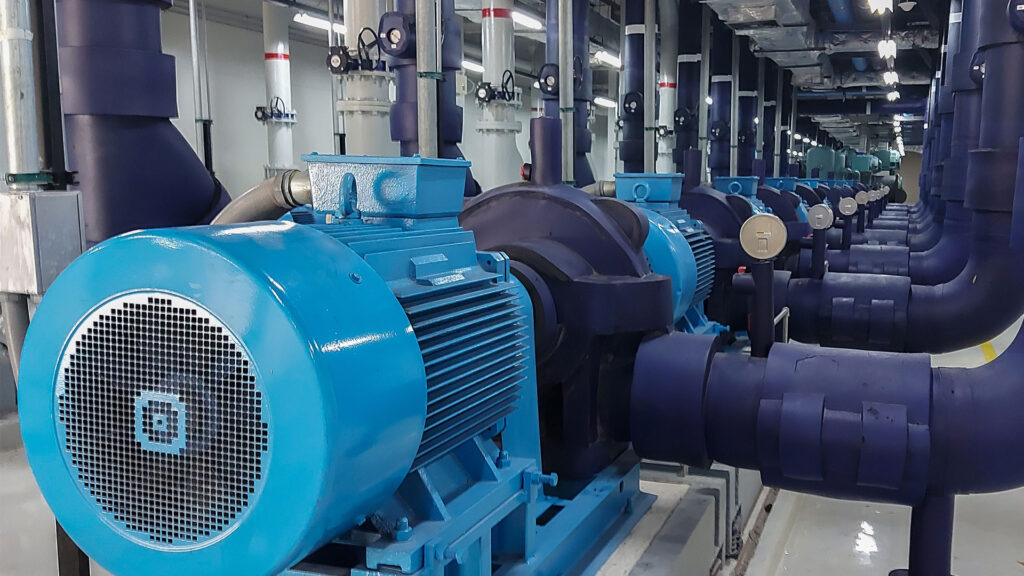
- Centrifugal Pumps:
- Utilize a rotating impeller to transfer fluids.
- Ideal for low-viscosity liquids and high-flow applications.
- These pumps operate efficiently in continuous-flow environments, making them suitable for water treatment and chemical processing where steady fluid movement is required. However, they may not effectively handle high-viscosity or particulate-laden fluids.
- Diaphragm Pumps:
- Use a reciprocating diaphragm to create suction.
- Suitable for corrosive or abrasive materials.
- Their seal-less design ensures minimal leakage, making them ideal for hazardous chemicals. Additionally, they can handle slurries and viscous substances, and their variable speed options offer excellent control over fluid flow rates.
- Peristaltic Pumps:
- Employ a rotating roller system to compress flexible tubing.
- Excellent for delicate or viscous substances.
- These pumps are particularly useful in applications requiring sterility, such as pharmaceutical and food-grade fluid handling. They are self-priming, capable of running dry without damage, and can handle shear-sensitive fluids without altering their properties.
- Magnetic Drive Pumps:
- Feature a magnetic coupling to eliminate direct contact between the motor and fluid.
- Known for leak-proof operation and chemical resistance.
- Their lack of mechanical seals reduces maintenance needs and prevents leaks entirely, making them highly reliable for toxic or volatile chemicals. Magnetic drive pumps are also energy-efficient and well-suited for applications where contamination prevention is critical.
The chemical pump is essential in industries to handle corrosive or hazardous substances.
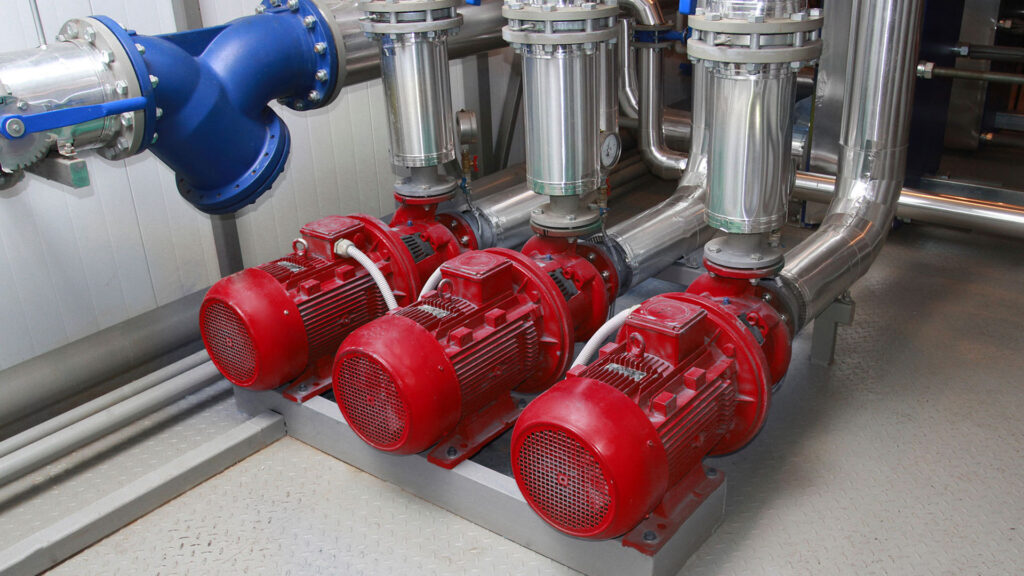
Handling Hazardous and Corrosive Materials
Industrial chemical pumps are specifically engineered to handle hazardous and corrosive materials safely, offering an essential layer of protection in environments where fluid mishandling could result in severe harm. This chemical pump is designed to prevent exposure to harmful substances, safeguarding both workers and the surrounding environment. By incorporating advanced sealing systems and durable materials, chemical pump can effectively manage even the most aggressive chemicals without compromising operational safety.
Features That Enhance Safety
- Leak-proof Designs:
- A Modern chemical pump incorporates a double-seal mechanism and magnetic coupling to eliminate leakage risk virtually. This feature is particularly critical in applications involving volatile or highly toxic chemicals.
- Non-metallic Components:
- Non-metallic materials such as PTFE (polytetrafluoroethylene) and polypropylene are widely used due to their excellent resistance to corrosion. These components also reduce the risk of chemical reactions that could compromise pump integrity.
- Explosion-proof Motor Options:
- Pumps designed for explosive environments are equipped with motors that meet stringent safety standards, such as ATEX certification, ensuring safe operation in hazardous zones.
- Fail-safe Mechanisms:
- Advanced models include built-in fail-safe mechanisms, such as automatic shut-off valves, to prevent damage in case of pressure surges or operational anomalies.
Compliance with Safety Standards and Regulations
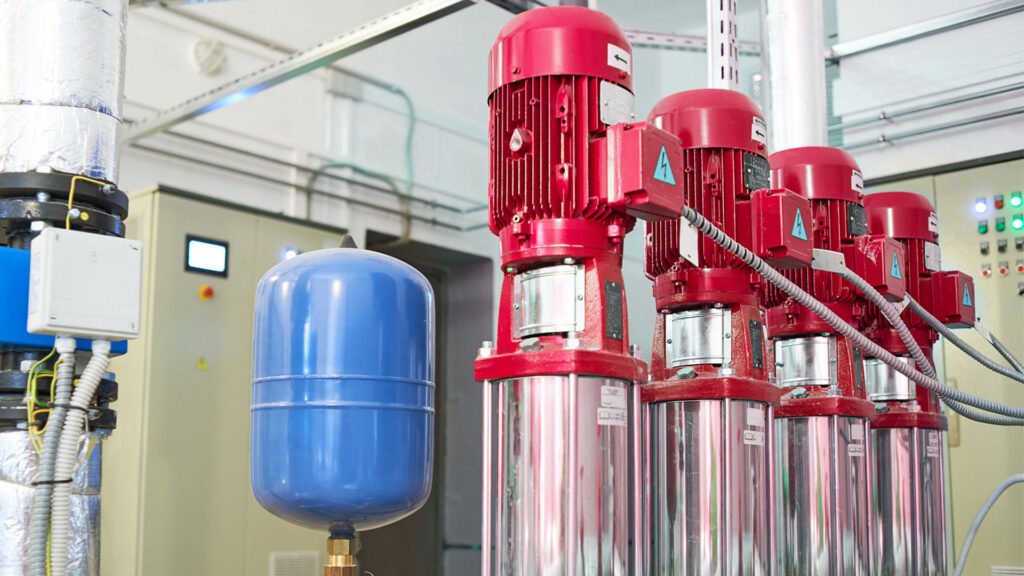
High-quality pumps are manufactured to adhere to the most stringent safety and performance standards, ensuring compliance with industry-specific regulations. Key standards include:
- OSHA (Occupational Safety and Health Administration):
- Ensures a safe working environment by mandating protective measures for handling hazardous materials.
- ANSI (American National Standards Institute):
- Establishes guidelines for the design and performance of a chemical pump to ensure consistency and safety.
- API (American Petroleum Institute):
- Defines best practices and operational standards for pumps used in oil and gas applications, ensuring reliability in demanding environments.
- ISO (International Organization for Standardization):
- Sets global benchmarks for safety and efficiency, particularly in chemical and pharmaceutical industries.
By adhering to these standards, industrial chemical pumps provide a reliable solution for managing hazardous fluids while maintaining operational safety and regulatory compliance.
Improving Efficiency in Fluid Handling
How a Chemical Pump Optimizes Fluid Transfer
- Precision and Flow Control:
- Advanced pump designs utilize highly calibrated impellers, diaphragms, and control mechanisms that allow for exceptional accuracy in dosing and flow rate adjustments. This precision is crucial in processes like chemical dosing in water treatment or pharmaceutical manufacturing, where even minor variations can have significant effects.
- Reduced Downtime:
- The incorporation of durable materials such as stainless steel or advanced composites ensures that components withstand prolonged operational stresses. ag chemical pumps designed with modular components also allow for quick and easy replacements, minimizing the need for extended shutdowns during maintenance.
- Energy-efficient Designs:
- Modern pumps employ high-efficiency motors and variable frequency drives (VFDs) to adjust motor speeds dynamically based on fluid demand. This not only conserves energy but also extends the life of the pump by reducing unnecessary wear during low-demand periods.
Automation and Advanced Control Systems
- Real-time Monitoring:
- IoT-enabled chemical pump is equipped with advanced sensors to continuously monitor flow rate, pressure, temperature, and other critical parameters. Operators receive instant alerts if performance deviates from predefined thresholds.
- Predictive Maintenance:
- Data from IoT sensors is analyzed to detect patterns indicating potential issues, such as bearing wear or cavitation. By addressing these issues proactively, facilities can avoid unexpected breakdowns and associated costs.
- Remote Operation:
- Automation allows operators to control pump operations remotely via centralized systems or mobile apps. This is particularly beneficial for facilities with multiple pumping stations, reducing the need for on-site personnel.
- Customizable Performance:
- Advanced control systems enable users to fine-tune pump operations to match specific process requirements. Parameters such as flow rate, pressure, and operating cycles can be programmed and adjusted as needed, enhancing overall efficiency and adaptability.
Applications Across Industries
Examples of Fluid Handling Needs in Different Sectors
Oil and Gas:
Industrial chemical pumps are critical for transporting volatile chemicals and ensuring precise flow in refining and drilling processes. They are essential for high-pressure applications in upstream and downstream activities and can handle a wide range of substances, from crude oil to chemical additives. Magnetic drive pumps and centrifugal pumps are commonly used in this sector to enhance safety and efficiency, making industrial chemical pumps indispensable for this industry.
Food and Beverage:
Industrial chemical pumps are used to handle food-grade chemicals and clean-in-place (CIP) solutions while maintaining hygiene standards. They must meet stringent sanitary requirements, including FDA and USDA compliance. Peristaltic and diaphragm pumps are often preferred because they can handle viscous or delicate materials, such as syrups, sauces, and dairy products, without contamination or degradation.
Pharmaceutical:
Industrial chemical pumps enable high-purity fluid transfer in sterile environments. Pumps in this industry must meet Good Manufacturing Practices (GMP) and be compatible with sterilization processes like autoclaving. Peristaltic ag chemical pumps are particularly effective for transferring shear-sensitive fluids, ensuring that active ingredients maintain their integrity. This further showcases the importance of industrial chemical pumps in critical applications.
Water Treatment:
Industrial chemical pumps are essential for managing corrosive and abrasive solutions in wastewater management and desalination. They are designed to handle challenging fluids, including brine, sludge, and chemical treatments. Diaphragm and centrifugal pumps are widely used for dosing and transferring these materials while ensuring durability in harsh conditions, underscoring their versatility across industries.
Selecting the Right Chemical Pump
Factors to Consider
Fluid Properties:
Assess the fluid’s viscosity, corrosiveness, and temperature when selecting industrial chemical pumps. Some fluids may require ag chemical pumps with specialized coatings or internal linings to resist chemical degradation or thermal stress. Consider whether the fluid contains particulates or solids, which might require industrial chemical pumps designed to handle abrasive materials.
Flow Rate and Pressure Requirements:
Accurately measure the desired flow rate and pressure to ensure the pump can deliver the required performance without straining. Applications with variable flow rates may benefit from industrial chemical pumps equipped with adjustable speed controls for greater precision and efficiency.
Material Compatibility:
Match pump materials to the fluid being handled to prevent chemical reactions or material wear. For instance, stainless steel is ideal for many corrosive substances, while plastics like PTFE are better for highly reactive chemicals. Industrial chemical pumps designed with non-metallic or composite materials may be necessary in extreme conditions, such as high acidity or alkalinity.
Operational Environment:
Assess ambient conditions, including temperature extremes, humidity, and exposure to corrosive atmospheres. Ag Chemical Pumps for outdoor applications may require weatherproof or explosion-proof enclosures to ensure the reliability and safety of industrial chemical pumps in demanding environments.
Importance of Consulting Experts
Tailored Recommendations:
Collaborating with experienced suppliers or engineers ensures the selection of industrial chemical pumps optimized for specific operational challenges. They can provide insights into cutting-edge technologies or specialized designs to meet unique requirements.
Cost-Efficiency:
Experts can help balance upfront investment with long-term savings by recommending energy-efficient or low-maintenance models of industrial chemical pumps.
Regulatory Compliance:
Proper consultation ensures adherence to industry standards and environmental regulations, avoiding potential fines or operational disruptions while maintaining the efficiency of industrial chemical pumps.
Maintenance and Longevity
Best Practices for Maintaining Industrial Chemical Pumps
Routine Inspections and Cleaning:
Conduct regular visual inspections to check industrial chemical pumps for cracks, leaks, or other wear. Schedule periodic cleaning to remove any residues that might affect their performance or cause blockages. Implement maintenance logs to ensure consistent and thorough inspections, improving their reliability.
Replacing Worn Components:
Establish an inventory of replacement parts to address wear and tear immediately. Components such as seals, bearings, and impellers should be replaced according to manufacturer recommendations. Delaying replacements can escalate minor issues into costly repairs or system shutdowns, particularly in ag chemical pumps.
Monitoring for Signs of Wear or Leakage:
Use advanced sensors and monitoring devices to detect subtle changes in pressure, flow rate, or temperature that may indicate wear. Address leaks promptly to avoid contamination or damage to surrounding equipment. Employ predictive maintenance tools to forecast potential issues based on operational data for better performance of industrial chemical pumps.
Training Operators:
Provide hands-on training for operators to understand industrial chemical pumps mechanics, proper handling techniques, and emergency procedures. Trained staff can identify and resolve minor issues before they escalate. Regularly update training programs to include new technologies or equipment updates.
This approach ensures the durability, efficiency, and safety of ag chemical pumps in demanding environments.
Emerging Trends and Innovations
New Materials Improving Pump Durability
Advanced materials, such as ceramic composites and fluoropolymers, are increasingly being used to improve the performance of chemical pump by combating wear and chemical corrosion. These materials extend pump lifespans significantly in aggressive chemical environments, reducing maintenance frequency and costs. Innovations in coatings, such as diamond-like carbon (DLC), further enhance surface resilience against high temperatures and abrasive fluids.
IoT-Enabled Ag Chemical Pump
Smart ag chemical pumps equipped with IoT technology are transforming fluid handling. These systems offer real-time tracking of parameters such as flow rate, temperature, and pressure. Predictive analytics help identify potential issues before failures occur, enabling proactive maintenance and reducing downtime. Remote control capabilities allow operators to adjust pump settings and monitor performance from anywhere, streamlining operations in large facilities.
Advances in Energy-Efficient Designs
Energy-saving technologies, including variable frequency drives (VFDs), dynamically adjust motor speed to match fluid demand, optimizing energy use. Solar-powered ag chemical pumps and integration with renewable energy sources are gaining traction, particularly in remote locations where grid power is unavailable. Computational fluid dynamics (CFD) is being used in the design of ag chemical pumps to minimize hydraulic losses, resulting in more efficient fluid movement and reduced energy consumption.
Conclusion
Ag chemical pumps are indispensable for ensuring safe and efficient fluid handling across various industries. By selecting
the right industrial chemical pumps, adhering to maintenance best practices, and leveraging emerging technologies, businesses can optimize their operations and achieve long-term success. Investing in high-quality equipment not only enhances productivity but also safeguards employees and the environment.
